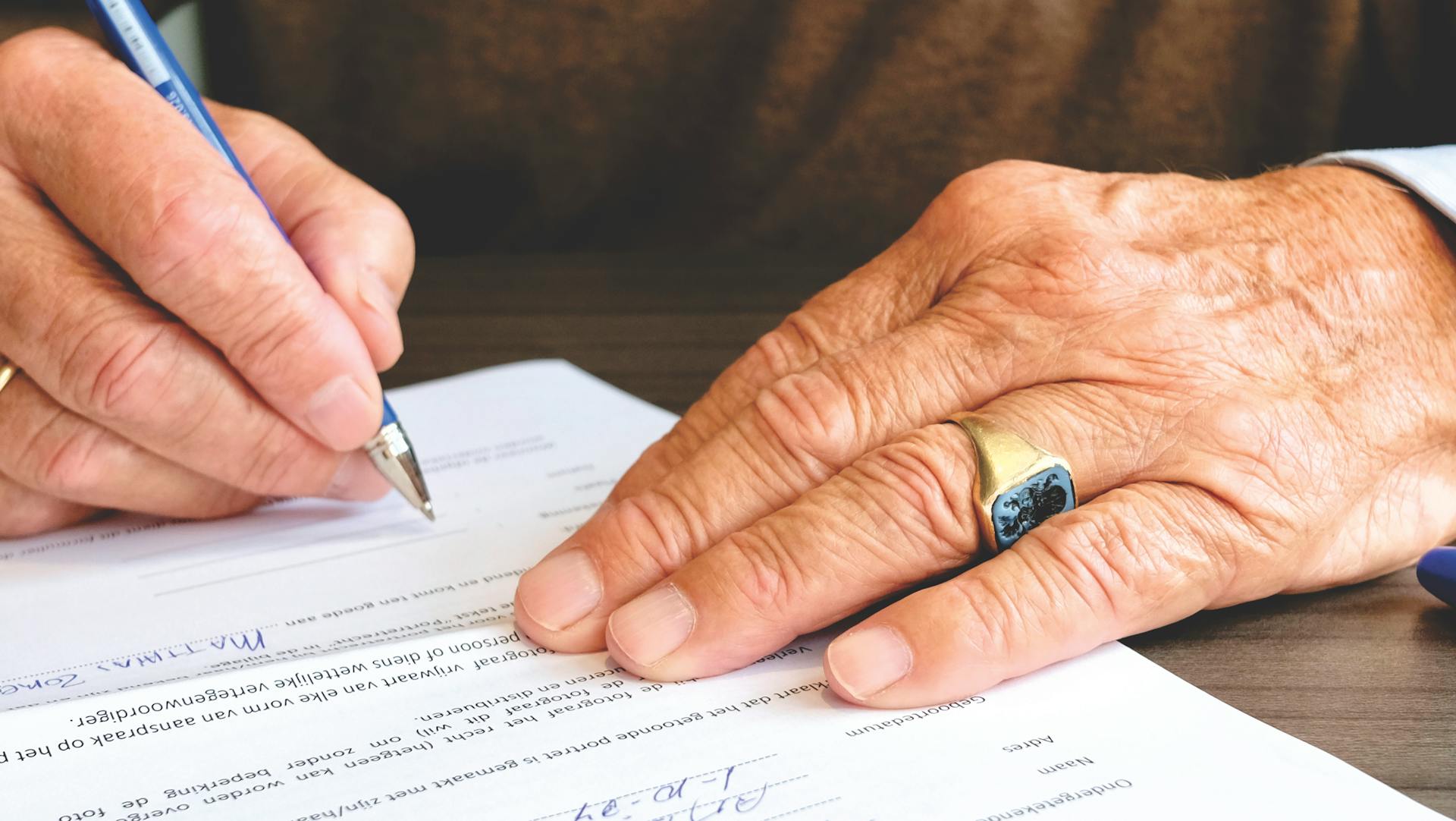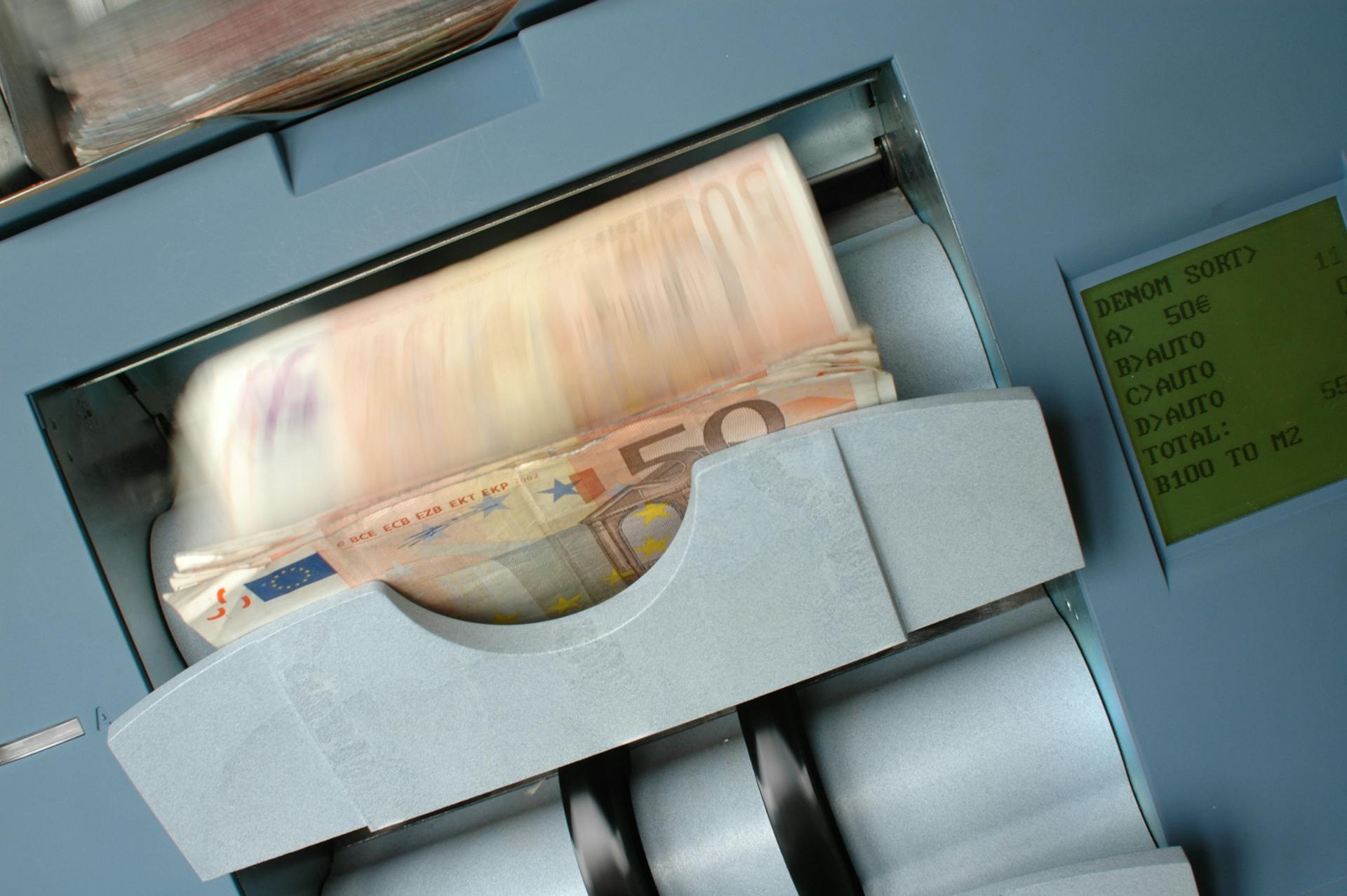
Personal checks have a limited lifespan, and it's essential to know when they expire to avoid any potential issues. Most banks and financial institutions consider personal checks to be valid for 6 months from the date they are issued.
The 6-month rule applies to both the check writer and the bank. If a check is more than 6 months old, the bank may not honor it, even if the funds are still available in the account.
This can be frustrating, especially if you've misplaced a check or need to use it after a long time. To avoid this, it's a good idea to keep track of when you wrote the check and ensure you use it within the 6-month timeframe.
See what others are reading: I M B Bank Share Price Today
Check Validity and Expiration
Personal checks are valid for six months, but some banks may be willing to cash or deposit them after the expiration date. This is because the Uniform Commercial Code (UCC) only requires banks to honor checks for up to six months.
Related reading: 3 Months of Bank Statements
If a check has expired, it's still possible to get a replacement check from the issuer. You can contact the issuer to see if they can provide a new check, and they may want to stop payment on the original check before doing so.
Some types of checks have different expiration dates than personal checks. U.S. Treasury checks, for example, are valid for one year, while state and local government checks may be valid for at least six months and possibly a year.
Cashier's checks can be more complicated, as the expiration date varies by the financial institution that issued the check. Look for the "void by" date on the check to determine if it's still valid.
Money orders, on the other hand, technically have no expiration date, but fees may be charged after a certain period. While USPS money orders never expire, Western Union charges service fees for money orders older than 1 to 3 years.
Here's a summary of the expiration dates for different types of checks:
- Personal and business checks: 6 months (180 days)
- U.S. Treasury checks: 1 year
- State and local government checks: varies by state or local jurisdiction laws, but generally 6 months to 1 year
- Cashier's checks: varies by financial institution, but typically 90 to 180 days
- Money orders: no expiration date, but fees may be charged after a certain period
- Certified checks: typically do not expire, but may be considered "stale" after 90 to 180 days
- Traveler's checks: do not expire if the issuing institution still exists
Cashing and Depositing Checks
Most types of checks clear within two business days, with the first $200 available the business day after the bank receives the check.
If you deposit a check on Thursday, $200 of it will be available by Friday, and the rest will be available by Monday.
Cashier's and government checks, along with checks drawn on the same financial institution that holds your account, usually clear faster, in one business day.
If you try to cash a check that's more than six months old, banks don't have to accept it. They can still process it, but it's best to contact the issuer first.
Banks may charge a "deposit item returned" fee if you try to cash an old check that bounces, ranging from $0 to $12 or more, depending on the bank.
It's always best to contact the issuer before trying to cash a stale or outstanding check, to avoid imposing an overdraft fee on the person or business that wrote it.
If this caught your attention, see: Bank of America How Long for Check to Clear
Check Clearance and Fees
Check clearance can be a tricky business, and it's essential to understand the fees involved. Some banks charge a "deposit item returned" fee if you try to cash an old check that bounces.
This fee varies from bank to bank, with Santander Bank charging $0 per check, while Bank of America charges $12. International checks might even incur a higher fee. The person who wrote the bounced check might also be charged a nonsufficient funds fee.
Check Clearance and Fees
Checks can be a hassle, especially when it comes to clearing them and dealing with fees. Banks don't have to accept checks that are more than six months old, according to the Uniform Commercial Code (UCC).
If you try to cash a stale check, you might get lucky and the bank will still process it, but they're not required to. This is because the institution deems the funds are good, but there's no guarantee.
Some banks may have a more flexible policy and cash a check even after it's expired, but this is not a standard practice. You're better off contacting the issuer to see if they can provide a replacement check.
Money orders, on the other hand, technically have no expiration date, but fees may be charged after a certain period. For example, USPS money orders never expire, but Western Union charges service fees for money orders older than 1 to 3 years.
Here's a breakdown of check expiration dates and associated fees:
If you're dealing with an expired check, it's always best to contact the issuer to see if they can provide a replacement check. This can save you from imposing an overdraft fee on the person or business that wrote it.
Check Clearance Time
Check clearance time can be a mystery, but it's actually quite straightforward. Most types of checks clear within two business days.
The clock starts on the business day a check is received, before the institution's cutoff time. This varies by bank, but for checks deposited at physical locations, a bank's cut-off time must be 2 p.m. or later; for those deposited at ATMs or elsewhere, a bank's cutoff must be noon or later.
Here's an example of the two-day standard: Thursday, you deposit a $1,000 check. On Friday, $200 of the check is available. Then, on Monday, the rest of the check ($800) is available.
Business days are weekdays that aren't a bank holiday. This means that if you deposit a check on a Friday, it will be held until Monday, even if the bank is open on Saturday.
Some banks and credit unions make funds available faster, though. For example, Bank of America, Capital One 360, and Citi usually make funds available the next business day, up to a certain amount.
Here's a list of some banks and credit unions that clear checks fast:
Cashier's and government checks, along with checks drawn on the same financial institution that holds your account, usually clear faster, in one business day.
Deposit Item Returned Fee
The "deposit item returned" fee is a charge you might face if you try to cash old checks that bounce. This fee varies from bank to bank.
For example, Santander Bank charges $0 for a bounced check, while Bank of America charges $12. If you're dealing with an international check, the fee might be even higher.
If the bounced check is a small amount that doesn't exceed the returned-check fee, you might be better off forgetting about it and moving on.
You might enjoy: Saving Account Charges
Alternatives and Options
If you're expecting a large amount, consider asking the payer for direct deposit or to wire the funds. This can save you time and avoid the hassle of waiting for a check to clear.
Transactions via mobile peer-to-peer payment apps are inexpensive and fast, and unlike checks, there's no need for pen and paper.
Consider reading: One - Mobile Banking
Options for Uncashed Checks
If you've got an uncashed check lying around, don't worry, you've got options. First, contact the issuer before trying to cash a stale or outstanding check, as it's better than imposing an overdraft fee on the person or business that wrote it.
You can ask for a new check if the old one is past six months old. Banks don't have to accept checks that are more than six months old, but they may still process an older check if they believe the funds are good.
If your bank won't cash it, reach out to the issuer to see if they can provide a replacement check. They may want to stop payment on the original check before providing a new one.
Some banks may have a more flexible policy, so it's worth checking with them to see if they'll cash a stale check. For example, Bank of America personal checks never expire, but the bank may still charge a fee to invalidate the check.
Here's a breakdown of the types of checks and their expiration dates:
Keep in mind that some banks may have different policies, so it's always a good idea to check with them directly. And if you're unsure about the status of a check, it's always best to contact the issuer or the bank that issued the check.
Broaden your view: E S a Payments
Alternatives to Checks
The time it takes for a check to clear can be unpredictable, but it usually takes days, not minutes.
Direct deposits are generally faster, taking less time to process than checks.
Wire transfers can also be a quick option for receiving large amounts of money.
P2P transfers, like those through mobile payment apps, are inexpensive and fast, making them a convenient alternative to checks.
Broaden your view: How Do I Use Venmo for the First Time
Frequently Asked Questions
Can I cash a personal check from 2 years ago?
Personal checks are generally considered "stale" after 6 months and may not be accepted by banks or credit unions. It's unlikely you'll be able to cash a personal check from 2 years ago, but it's worth checking with the bank to confirm their policy.
Can a certified cheque expire?
A certified cheque does not typically expire, unlike personal cheques which have a six-month shelf life. However, bank policies may vary, so it's best to check with the issuer for specific details.
Sources
- https://www.nerdwallet.com/article/banking/how-long-does-a-check-take-to-clear
- https://money.stackexchange.com/questions/39609/how-long-are-checks-issued-by-bank-of-america-valid
- https://www.citizensbank.com/learning/how-long-is-a-check-good-for.aspx
- https://www.investopedia.com/ask/answers/082216/when-do-checks-expire.asp
- https://www.bankrate.com/banking/checking/how-long-is-a-check-good-for/
Featured Images: pexels.com


